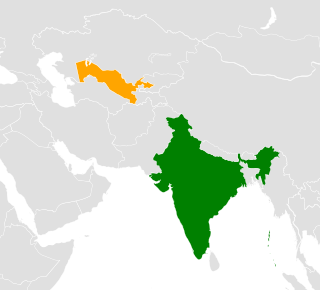
Uzbekistan, officially the Republic of Uzbekistan, is a doubly landlocked country located in Central Asia. It is surrounded by five countries: Kazakhstan to the north, Kyrgyzstan to the northeast, Tajikistan to the southeast, Afghanistan to the south, and Turkmenistan to the southwest, making it one of only two doubly landlocked countries on Earth, the other being Liechtenstein. Uzbekistan is part of the Turkic world, as well as a member of the Organization of Turkic States. Uzbek, spoken by the Uzbek people, is the official language and spoken by the majority of its inhabitants, while Russian and Tajik are significant minority languages. Islam is the predominant religion, and most Uzbeks are Sunni Muslims.
As of 2007, Uzbekistan's overland transportation infrastructure declined significantly in the post-Soviet era due to low investment and poor maintenance. Air transport was the only branch that received substantial government investment in the early 2000s, as airport modernization projects were undertaken. In the following years, improvements have been made to the surface transport network including the construction of the Tashkent–Samarkand high-speed rail line.

Tashkent, or Toshkent in Uzbek, is the capital and largest city of Uzbekistan. It is the most populous city in Central Asia, with a population of more than 3 million people as of April 1st 2024. It is located in northeastern Uzbekistan, near the border with Kazakhstan.

Westminster International University in Tashkent is an international university in Tashkent, Uzbekistan. It was founded in 16 January 2002 by the Umid Foundation, the Ministry of Higher and Secondary Specialized Education of Uzbekistan, and the University of Westminster in London. The university admitted its first students in 2002, enrolling 120 students. It is considered the first international university in Uzbekistan and the first internationally accredited institution in Central Asia.

JSC Uzbekistan Airways, operating as Uzbekistan Airways, is the flag carrier of Uzbekistan, headquartered in Tashkent. From its hub at Islam Karimov Tashkent International Airport, the airline serves a number of domestic destinations; the company also flies international services to Asia, Europe and North America.

Russian Turkestan was the western part of Turkestan within the Russian Empire’s Central Asian territories, and was administered as a Krai or Governor-Generalship. It comprised the oasis region to the south of the Kazakh Steppe, but not the protectorates of the Emirate of Bukhara and the Khanate of Khiva. It was populated by speakers of Russian, Uzbek, Kazakh, Kyrgyz, and Tajik.

Islam Karimov Tashkent International Airport is the main international airport of Uzbekistan and the third busiest airport in Central Asia. It is located 12 km (7.5 mi) from the center of Tashkent. It was named after Islam Karimov, the first president of independent Uzbekistan, in office from 1991 until his death in 2016.

Uzbekistan Super League, known as Coca-Cola Uzbekistan Super League due to sponsorship reasons, is the top division of professional football in Uzbekistan. It is operated under the auspices of the Uzbekistan Professional Football League and Uzbekistan Football Association. It was founded in 1992 and currently has 14 teams. The top team qualifies to the group stage of the AFC Champions League.

PFC Lokomotiv Tashkent is an Uzbek professional football club based in Tashkent.
The O‘zbekiston Kubogi or Uzbek Cup is the top knockout tournament in Uzbek football (soccer).

In the post-Soviet era, the quality of Uzbekistan’s health care has declined. Between 1992 and 2003, spending on health care and the ratio of hospital beds to population both decreased by nearly 50 percent, and Russian emigration in that decade deprived the health system of many practitioners. In 2004 Uzbekistan had 53 hospital beds per 10,000 population. Basic medical supplies such as disposable needles, anesthetics, and antibiotics are in very short supply. Although all citizens nominally are entitled to free health care, in the post-Soviet era bribery has become a common way to bypass the slow and limited service of the state system. In the early 2000s, policy has focused on improving primary health care facilities and cutting the cost of inpatient facilities. The state budget for 2006 allotted 11.1 percent to health expenditures, compared with 10.9 percent in 2005.

Russia–Uzbekistan relations are the bilateral relations between Russia and Uzbekistan.

Football Club Bunyodkor is an Uzbek professional football club based in Tashkent that competes in the Uzbekistan Super League.

United Kingdom–Uzbekistan relations are the bilateral and diplomatic relations between these two countries.
The 2012 AFC Futsal Club Championship qualification will be held in late 2012 to determine 4 spots to the final tournament in Kuwait City. The teams finishing first, second and third in the 2011 AFC Futsal Club Championship, and the host Champion for the 2012 competition, receive automatic byes to Finals.

Numon Khasanov is an Uzbekistani football manager and former player who is head coach of Khujand. A forward, he played for Uzbekistan in the 1996 Asian Cup.

Sardor Ikhtiyorovich Rashidov is an Uzbek professional footballer who plays as a winger for Navbahor and the Uzbekistan national team.
Davron Khashimov is an Uzbekistani footballer who plays for PFC Lokomotiv Tashkent and Uzbekistan national team. He played in the 2015 AFC Asian Cup qualification.

India–Uzbekistan relations are the international relations that exist between the Republic of India and the Republic of Uzbekistan. India has an embassy in Tashkent; Uzbekistan has an embassy in New Delhi.














